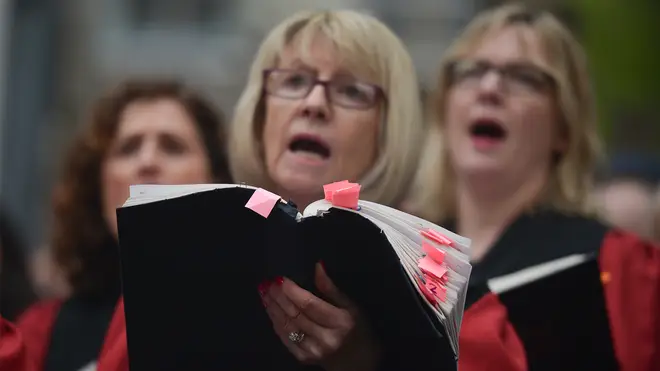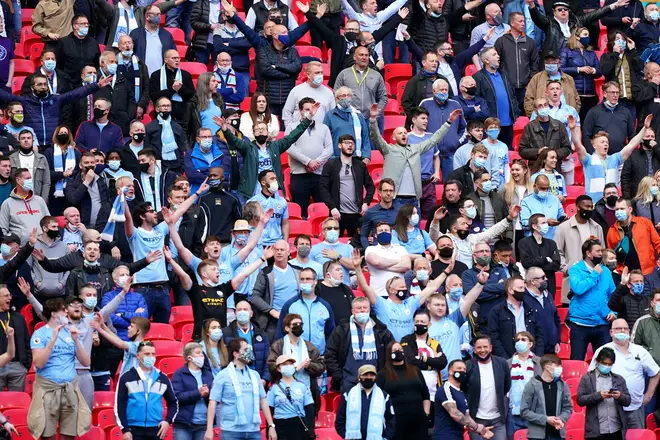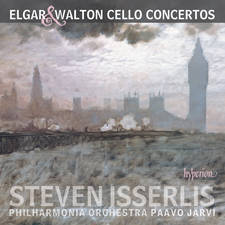‘10,000 singing football fans, but only 6 in a choir?’ – amateur choirs react to COVID rules
19 May 2021, 13:12 | Updated: 19 May 2021, 13:27

Amateur choirs have been left bitterly disappointed, as restrictions say non-professional singing can only take place in groups of six indoors.
Like so many other activities, amateur singing was brought to a halt by the coronavirus pandemic.
And choirs across the country have been left disappointed by new COVID-19 rules published a day after restrictions changed, on 18 May, which say all indoor amateur music-making must involve no more than six people.
Glen Dempsey, assistant director of music at Ely Cathedral, was among many musicians tweeting about the new guidance. “10,000 football fans singing in football stadiums, dozens singing in pubs, yet only 6 non-professionals are allowed to sing in our cavernous cathedrals, churches, theatres and concert halls,” Dempsey questioned.
While elite sport guidance says singing should be “discouraged” in all settings, event organisers are also urged to encourage the use of face coverings “given the higher risk of transmission associated with singing”.

University of Sheffield musicologist Dr Katie Bank, added: “So what if we are just in the pub but happen to all be looking at the same piece of music?”
While pubs are now open, government guidance says landlords should “prevent shouting, singing and dancing in the venue by making sure music and broadcasts are played at a low volume.”
The Department for Culture, Media and Sport (DCMS) told Classic FM it must take “a cautious and phased approach in easing restrictions”.
Read more: What are the new rules for rehearsals, concerts and live music venues?

Welsh male voice choir sing together again after Covid restrictions lifted
Health benefits of singing
Many on Twitter have urged DCMS and culture secretary Oliver Dowden to consider the health benefits of singing in pandemic times.
Organist Anna Lapwood tweeted: “This is ridiculous and another blow to our industry. Why are people allowed to eat in crowded restaurants when choirs can’t meet socially-distanced in well-ventilated rooms?
“Oliver Dowden please realise that choirs do so much for health & well-being & we need your support!!”
In late April, ministers advised the intention was for non-professional music activity to resume with bigger numbers indoors. But after consulting with public health ministers, the guidance was updated on 18 May to clarify that only six amateur singers can meet indoors, and up to 30 singers can meet for a rehearsal outside.
Throughout the pandemic, DCMS has highlighted “high public health risks” around singing, some musical instruments, shouting, and physical activity due to increased risk of transmission through small droplets and aerosols.

Parent and baby choir sings ‘Come and Stand in That River’
A choral COVID-19 pilot
The Royal Choral Society suggested its Messiah concert on 30 May be used as a “singing test event”.
In April, football matches hosting crowds of more than 4,000 – the largest to have watched a football match at a major British stadium for over a year – were hosted at Wembley in London (see photo above).
And at the beginning of May, a live music pilot event took place in Liverpool, with no social distancing or masks. Fans at both events had to a negative lateral flow test to enter, then take a PCR test five days later.
Nine days later, the Brit Awards had a live audience under the same regulations.
No classical music or choral pilot events have yet been slated to take place.
Conductor Andrew Griffiths, who sings with leading vocal ensemble Stile Antico, said: “The guidance around amateur singing is a disgrace. There are thousands upon thousands of heartbroken singers today. And yet pubs, restaurants, saunas, spin classes are all permitted.”
Here we are last night. Really spaced, huge venue, lots of protocols. Can't tell you how lovely it was to hear people singing around you. @DCMS - this is a safe, managed way to help people with their wellbeing, get singing back on track and give our professionals their jobs back. pic.twitter.com/kuBGhjpynf
— Vivace Chorus (@VivaceChorus) May 18, 2021
Knock-on effects on professional musicians
Singers have been left frustrated that, a day after assuming – based on minister Caroline Dinenage’s words at a conference – that socially distanced rehearsals would be allowed, the advice was updated.
Alex Aitken, cover conductor for the West End’s Mary Poppins tweeted: “We at Milton Keynes Chorale have been working SO hard preparing for safe rehearsals. Whilst measuring distances this afternoon we find out you’ve stopped us? Fuming.”
Having already had a rehearsal on Monday night, the Vivace Chorus tweeted: “This is a safe, managed way to help people with their wellbeing, get singing back on track and give our professionals their jobs back.”
Other musicians on Twitter emphasised the impact of restricting amateur music-making on the professional music sector. Many amateur choral societies have a professional conductor and accompanist and employ professional soloists for concerts.
Tenor and founder of the Oxford Oratorio, Benjamin Hulett, tweeted: “Messing about with the amateur singing infrastructure has knock-on effects on professional musicians. We are bleeding. Not good enough.”
DCMS confirmed to Classic FM: “We must take a cautious and phased approach in easing restrictions. Changes in step three in line with wider social contact rules mean an amateur choir or performance group of up to six people or two households can now sing indoors, and outdoors in groups of up to 30.”


































